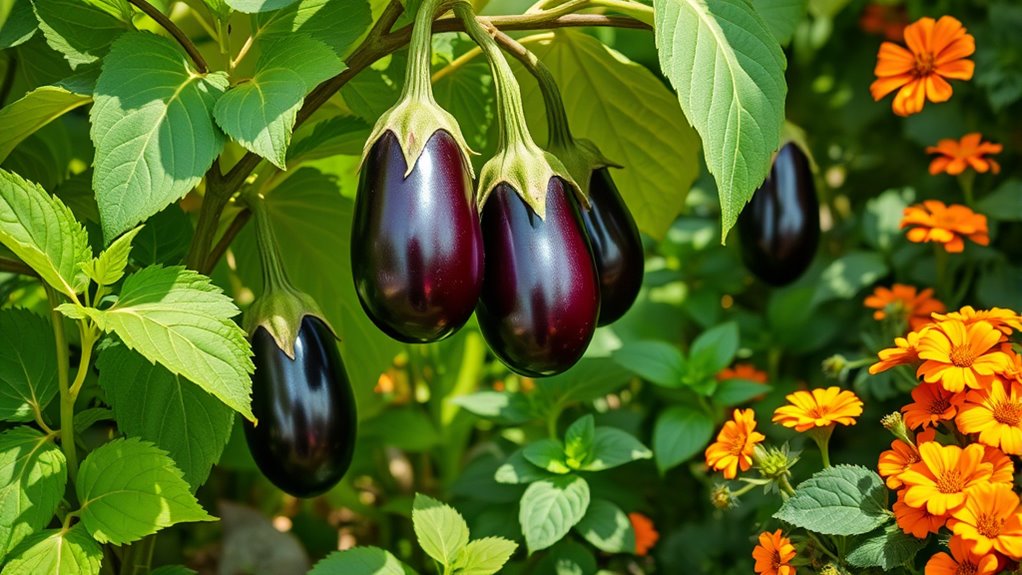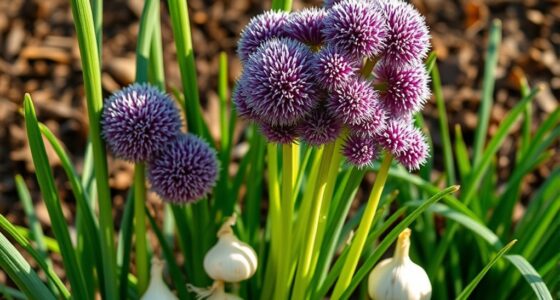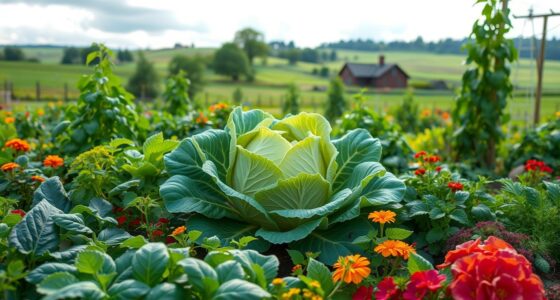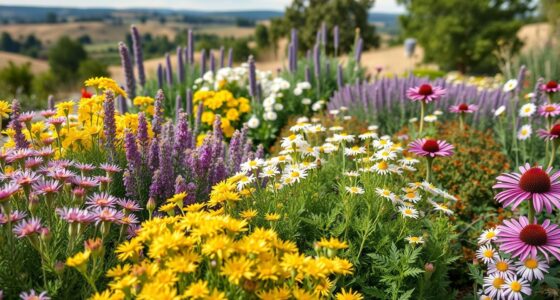Plant basil near your eggplants to naturally repel pests and improve flavor, while marigolds help protect against beetles, nematodes, and aphids by releasing pest-repelling compounds. Nasturtiums act as a barrier, attracting beneficial insects and masking eggplant scents to deter pests. Incorporate lettuce, spinach, or beans for ground cover and soil enrichment, and borage to draw pollinators. Discover how combining these companions can boost your garden’s health and yield.
Key Takeaways
- Basil, marigolds, nasturtiums, and borage effectively repel pests and attract beneficial insects, supporting healthy eggplant growth.
- Marigolds improve soil health by suppressing pathogens and encouraging beneficial microbes.
- Nasturtiums serve as natural pest barriers, mask eggplant scent, and attract pollinators.
- Legumes like beans and peas fix nitrogen, enhance soil fertility, and maximize space with vertical growth.
- Companion plants add aesthetic value, support ecosystem diversity, and promote natural pest control for eggplants.
Basil
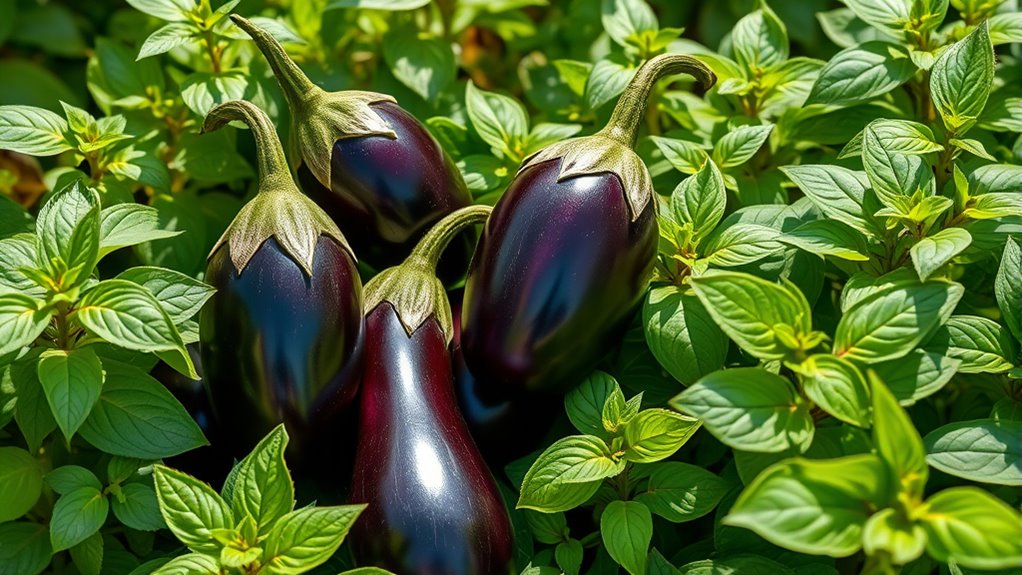
Basil is one of the best companion plants for eggplant because it naturally repels pests like aphids, whiteflies, and spider mites. When you plant basil nearby, it releases aromatic oils that confuse and deter these pests, reducing the risk of infestations. This not only protects your eggplants but also encourages healthier growth. Plus, basil’s strong scent can help mask the smell of eggplant, making it less attractive to pests seeking a meal. You’ll also enjoy fresh basil for cooking, adding flavor to your dishes. Guarantee you plant basil close enough to benefit from its pest-repelling properties, but not so crowded that airflow is restricted. With basil, you get a dual benefit: pest control and fresh herbs for your kitchen. Additionally, incorporating plants with high essential oil content can enhance pest deterrence, making your garden even more resilient and naturally protected. Using companion planting techniques can further optimize your garden’s health and pest management strategies. Introducing plant diversity can also help create a balanced ecosystem that naturally suppresses pest populations.
Marigolds
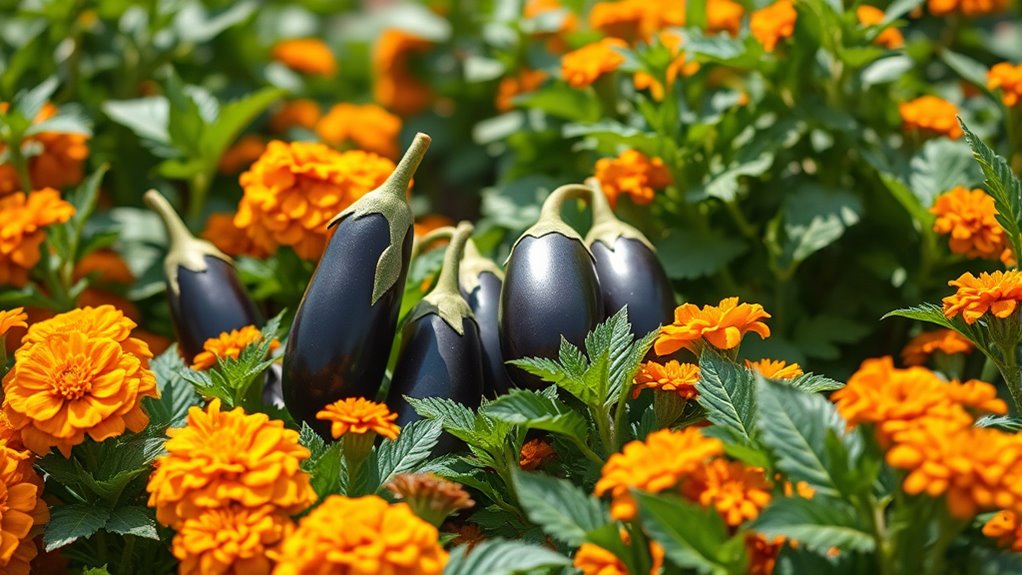
Planting marigolds near your eggplants can help keep pests like beetles and nematodes at bay. Their natural pest-repellent properties make them a great companion for healthy plants. Plus, marigolds can boost your eggplants’ growth by improving soil quality and attracting beneficial insects. Additionally, incorporating integrated pest management strategies can further enhance your garden’s health and productivity. Understanding local city dynamics can also help you select optimal planting times and locations for your garden. Utilizing sound mixing techniques in your garden planning can improve pest control efficiency and plant health. Incorporating essential oils for pest repellent in your garden care routine may also provide an extra layer of protection against pests. Employing companion planting strategies that include marigolds can further increase the effectiveness of your pest control efforts and promote a thriving garden.
Marigolds’ Pest Control
Marigolds are a popular companion plant for eggplants because they naturally repel many pests that threaten your crop. Their strong scent confuses and deters nematodes, aphids, and whiteflies, reducing the need for chemical treatments. Marigolds release compounds into the soil that inhibit pest activity, creating a protective barrier around your eggplants. Additionally, their presence attracts beneficial insects like ladybugs and predatory wasps, which help control pest populations naturally. Planting marigolds around your eggplants is an easy, cost-effective way to improve pest management without harming your plants or the environment. Research shows that marigolds also contribute to soil health by suppressing harmful nematodes and promoting beneficial microorganisms. This natural approach aligns with cybersecurity principles of layered defense, emphasizing the importance of integrated pest management strategies. Incorporating marigolds into your garden can also enhance emotional well-being by providing vibrant blooms and a sense of satisfaction from natural pest control. Moreover, understanding the yarn for scarves yardage requirements can help ensure proper plant spacing and garden design, maximizing the effectiveness of your pest control strategy. Implementing integrated pest management techniques ensures a balanced and sustainable approach to pest control, reducing reliance on chemical solutions. Keep in mind, while they are highly effective against certain pests, marigolds work best as part of an integrated pest control strategy rather than a standalone solution.
Marigolds Enhance Growth
Building on their pest-repelling properties, marigolds also boost eggplant growth by improving soil health and nutrient availability. Their roots release compounds that suppress harmful soil pathogens, creating a healthier environment for your eggplants. soil microbial activity can benefit from understanding how soil microbial activity, encouraged by marigolds, enhances nutrient cycling. A new sentence with soil microbial activity and the rest of the sentence. Marigolds attract beneficial insects, such as pollinators and predatory insects, which help maintain a balanced ecosystem. Additionally, their presence encourages soil microbial activity, breaking down organic matter and releasing essential nutrients like nitrogen and phosphorus. This natural process enhances soil fertility without the need for chemical fertilizers. Moreover, soil health is improved through the organic matter decomposition stimulated by microbial activity, providing a sustained nutrient supply. The presence of marigolds also supports integrated pest management, reducing the need for chemical interventions. Incorporating marigolds into your garden not only helps control pests but also creates ideal conditions for your eggplants to thrive.
Nasturtiums
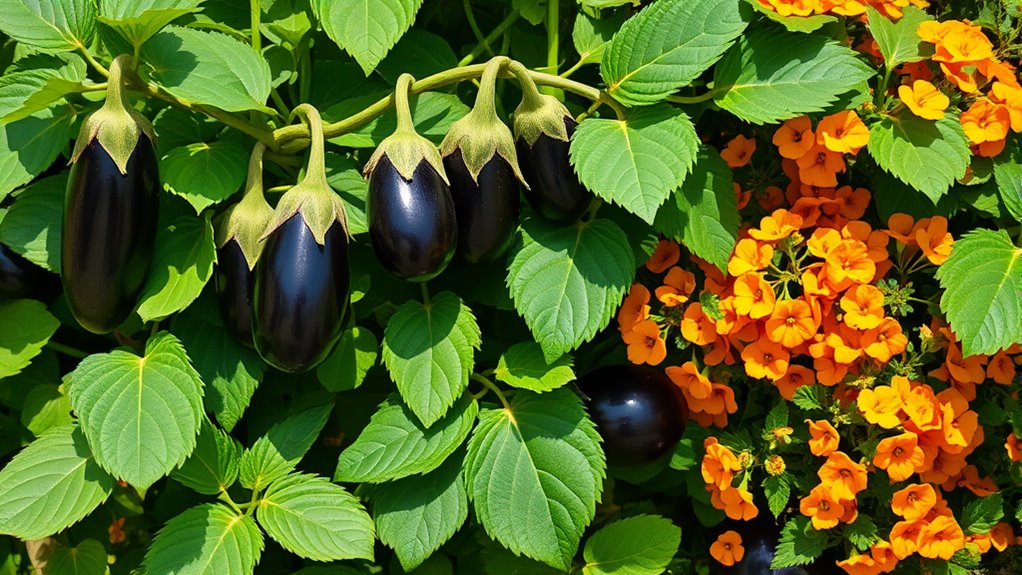
Nasturtiums are a great companion for eggplants because they can help deter pests that threaten your plants. They also attract beneficial insects that keep pest populations in check. Plus, their bright foliage adds a vibrant touch to your garden, making it more visually appealing. Additionally, planting nasturtiums demonstrates strategic planning through companion planting, which can improve overall crop health and yield. Incorporating such plant symbiosis practices can lead to a more resilient garden ecosystem and enhance your understanding of cultural intelligence in gardening strategies.
Pest Deterrent Properties
Because nasturtiums emit strong scents that pests find unappealing, planting them near eggplants can be an effective natural deterrent. Their aroma confuses or repels common pests like aphids, squash bugs, and beetles, reducing damage without chemicals. To maximize their pest-repelling effects, consider these points:
- Place nasturtiums at the edges of your eggplant bed to create a barrier.
- Ensure they are dense enough to mask the scent of your eggplants.
- Regularly monitor and trim the nasturtiums to maintain their health and scent strength.
Attracts Beneficial Insects
Nasturtiums not only repel unwanted pests but also attract beneficial insects that help keep your eggplants healthy. Bees and hoverflies are drawn to their vibrant flowers, which promote pollination and boost fruit production. Ladybugs and parasitic wasps also visit nasturtiums, feeding on aphids and other harmful pests before they reach your eggplants. By planting nasturtiums nearby, you create an inviting environment for these helpful insects, reducing the need for chemical controls. Their presence encourages a balanced ecosystem where pests are naturally kept in check. Additionally, providing habitat diversity through companion planting can further support the presence of beneficial insects. Plus, the bright, colorful blossoms serve as a visual cue for beneficial insects to land and stay, enhancing your garden’s natural defenses. This symbiotic relationship supports healthier eggplants and promotes a thriving garden overall. Incorporating companion planting strategies can further optimize pest management and plant health, especially considering the cultural significance of native plants in supporting local ecosystems. Using the right tea accessories can also help gardeners maintain healthy plants by ensuring proper watering and care.
Enhances Visual Appeal
Adding nasturtiums to your eggplant garden instantly boosts its visual appeal with their vibrant, colorful blossoms. Their bright reds, oranges, and yellows create a lively contrast against the dark green eggplant leaves, making your garden more attractive. Plus, their trailing growth habit adds texture and depth to your planting layout. To maximize their visual impact, consider these tips:
- Plant nasturtiums near the front of your garden beds for immediate color.
- Use different varieties to add a mix of flower shapes and shades.
- Combine with other low-growing plants to enhance layered visual interest.
Not only do nasturtiums beautify your space, but they also attract pollinators, creating a vibrant, lively garden scene.
Lettuce and Spinach
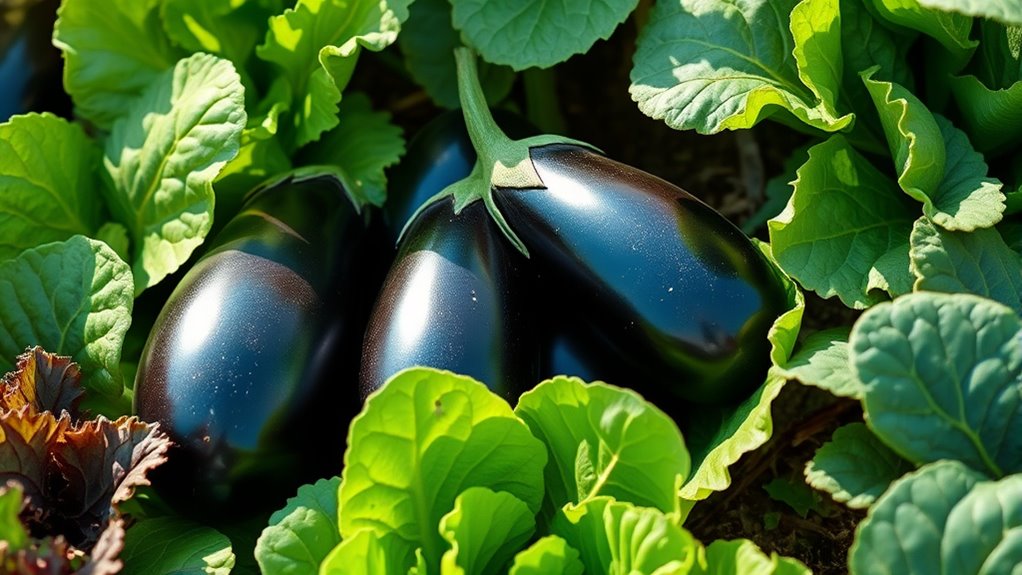
Lettuce and spinach make excellent companions for eggplants because they grow quickly and can be harvested early, freeing up space for the eggplant to flourish. Their fast growth allows you to maximize your garden’s productivity and prevent weeds. Plus, their shallow roots won’t compete with the deeper roots of eggplants. You can plant these leafy greens around eggplants to create a lush, productive border. Here’s a quick guide:
| Plant | Benefit |
|---|---|
| Lettuce | Quick harvest, easy to manage |
| Spinach | Adds nitrogen to soil, fast-growing |
| Companion Use | Provides ground cover, prevents weeds |
| Harvest Timing | Early, so space is freed for eggplant |
This pairing keeps your garden efficient and thriving.
Beans and Peas
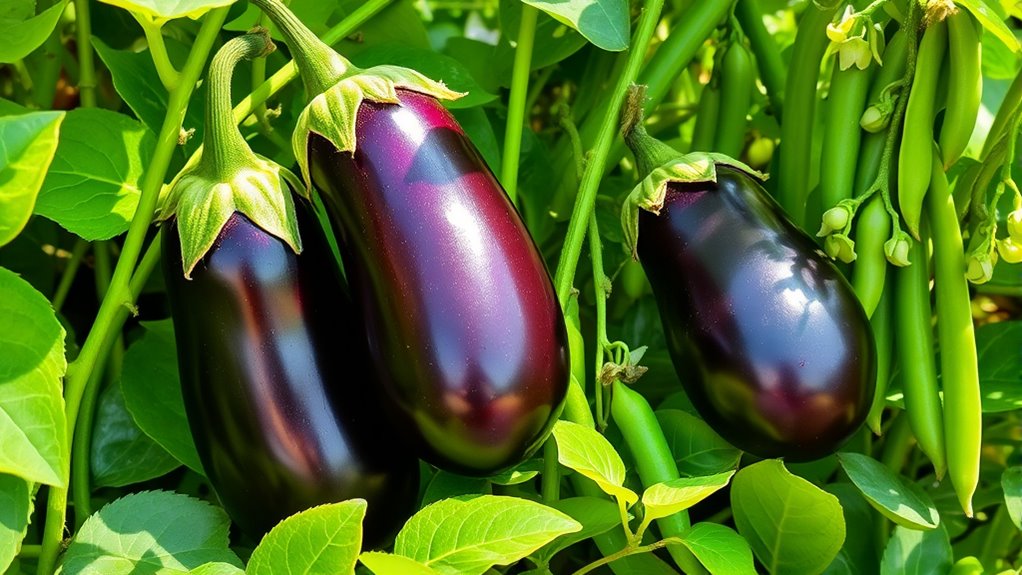
Beans and peas are excellent companions for eggplants because they improve soil health and maximize space. These legumes fix nitrogen in the soil, providing essential nutrients that help your eggplants thrive. Plus, their vertical growth habits save ground space, making your garden more efficient. To get the most benefits, consider these key points:
- Plant early to give beans and peas enough time to mature alongside your eggplants.
- Use trellises or stakes to support beans and peas, keeping them off the ground and promoting airflow.
- Rotate crops annually to prevent disease buildup and maintain soil health.
Borage
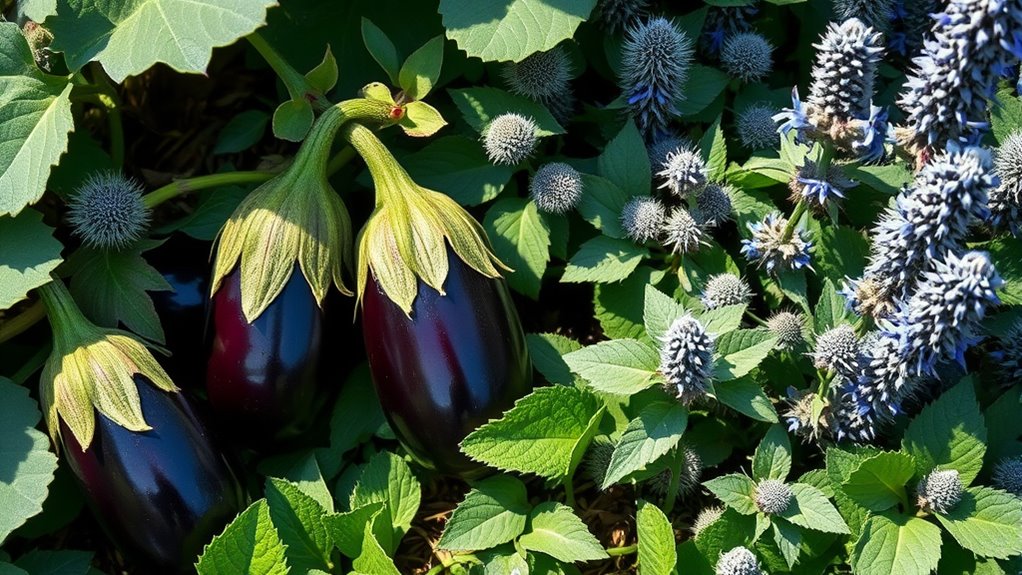
Borage is a beneficial companion plant for eggplants because it attracts pollinators and repels pests. When you plant borage nearby, bees and other pollinators flock to it, improving eggplant fruit set. Its bright blue flowers draw in beneficial insects that help control aphids and tomato hornworms. Additionally, borage’s strong scent confuses pests, keeping them away from your eggplants. You don’t need to do much; simply sow borage seeds close to your plants early in the season. As it grows, borage adds a lush, attractive look to your garden while supporting healthy eggplant development. Plus, its edible leaves and flowers can be harvested for culinary uses, making it a versatile addition to your garden ecosystem.
Frequently Asked Questions
How Do Companion Plants Improve Eggplant Yield?
Companion plants can boost your eggplant yield by attracting beneficial insects that pollinate or prey on pests, reducing damage. They can also improve soil health, provide shade, or act as natural barriers against weeds and pests. By choosing the right companions, you create a balanced environment that encourages healthy growth. This synergy helps your eggplants thrive, resulting in better yields and healthier plants overall.
Can Certain Flowers Repel Eggplant Pests Effectively?
Certain flowers can indeed repel eggplant pests effectively. Marigolds, for example, release compounds that deter nematodes and aphids, helping protect your eggplants. Nasturtiums also act as trap crops, attracting pests away from your plants. By planting these flowers nearby, you create a natural pest barrier, reducing the need for chemical treatments. Incorporating pest-repelling flowers into your garden supports healthier, more productive eggplants.
Are There Specific Planting Times for Optimal Companion Planting?
Think of your garden as a symphony where timing is key. You should plant your eggplants and their companions when conditions are just right—warm soil and longer days signal it’s time to start. For the best harmony, sow your eggplants after the last frost and time your companion plants to grow alongside them, creating a vibrant, pest-resistant chorus that prospers together. Proper timing guarantees a lush, fruitful harvest.
Do Some Companions Attract Beneficial Insects to Eggplants?
Some companion plants attract beneficial insects to protect eggplants naturally. You can plant marigolds, dill, or fennel nearby because they lure pollinators and predatory insects that prey on pests. These beneficial insects help keep your eggplants healthy by reducing pest populations. By choosing the right companions, you create an ecosystem that supports your eggplants, minimizes chemical use, and boosts your garden’s overall health and productivity.
Can Companion Planting Reduce the Need for Chemical Pesticides?
While it’s tempting to rely solely on pesticides, companion planting offers a more elegant solution. By choosing the right plants, you can naturally deter pests and invite helpful insects, reducing your chemical usage. Think of it as creating a balanced garden ecosystem that promotes healthy growth. With thoughtful plant choices, you can enhance your eggplants’ resilience, making chemical interventions less necessary and your garden more sustainable and vibrant.
Conclusion
By choosing the right companion plants, you can naturally boost your eggplant’s health and yield. Some might think companion planting is complicated or ineffective, but it’s a simple, eco-friendly way to improve your garden. Trust us, mixing basil, marigolds, or nasturtiums with your eggplants isn’t just pretty—it’s practical. Give it a try, and you’ll likely see healthier plants and better harvests without relying on chemicals. It’s worth the effort for a thriving garden!
